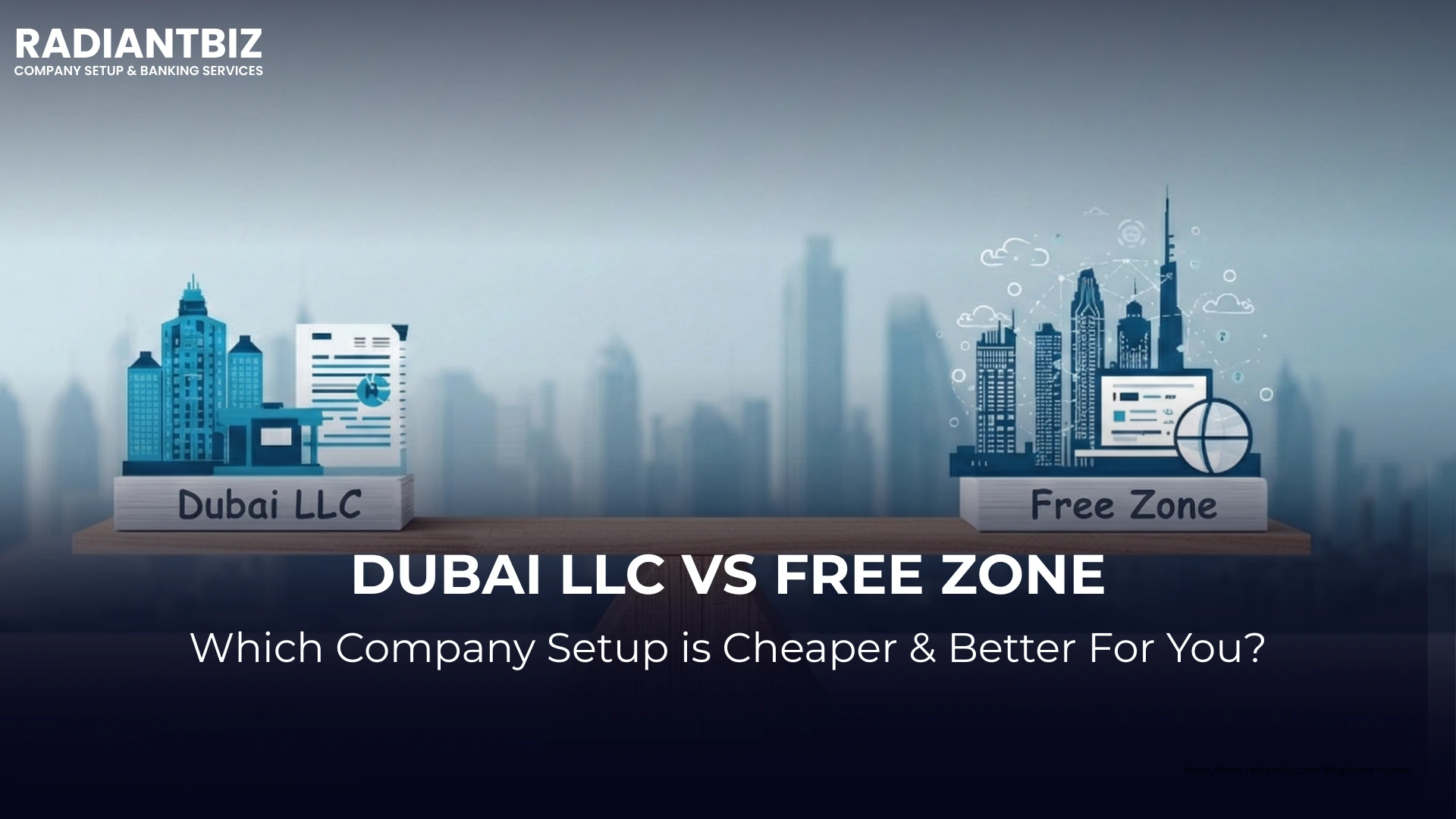Common Mistakes to Avoid When Setting Up a Business in Dubai

%20(1).webp)
Table of Contents
Setting up a business in Dubai is a dream for many entrepreneurs, thanks to its strategic location, pro-business policies, tax advantages, and world-class infrastructure. However, while the UAE makes it relatively easy to get started, success depends heavily on avoiding costly missteps. From legal structure confusion to compliance blind spots, the journey can become complicated if you’re not well-prepared.
This article analyzes the most common mistakes entrepreneurs make in setting up shops in Dubai, and how to avoid them so you can open confidently and clearly.
Choosing the Wrong Business Jurisdiction in Dubai
One of the most significant and initial decisions you will encounter is choosing the right business jurisdiction. You may choose a mainland company formation in Dubai, a Dubai free zone company set up in one of over 20 free zones in the emirate, or an offshore company formation in the UAE. Each jurisdiction has different regulations, benefits, and limitations.
One frequent error is making a decision solely on price. For example, although offshore arrangements might appear cheaper, they do not allow local trade within the UAE. Similarly, free zone entities provide tax benefits and full ownership but tend to be restricted from direct activity in the local UAE market except through a distributor.
Choosing the wrong jurisdiction can limit your operational capacity, hinder growth, and even lead to compliance violations. The right structure should be in harmony with your business model, customer base, and long-term aspirations.
Ignoring the Importance of Licensing
Every business in Dubai requires a license, but not all Dubai business licenses are the same. Entrepreneurs have a tendency to misunderstand the different categories, commercial, professional, and industrial, and get a license that does not match their true activities.
This discrepancy can cause severe problems, such as cancellation of the license or legal fines. For instance, operating a consultancy on a commercial license rather than a professional one can result in fines. It is necessary to align your business activities exactly with the license provided by the Dubai DED (Department of Economic Development) or your respective free zone.
Always clarify what business activities your company will undertake and seek advice from a business license consultant in Dubai prior to doing so.
Underestimating Local Sponsorship Regulations (for Mainland Companies)
While there are recent reforms allowing 100% foreign ownership in most industries, some mainland business setups in Dubai still must have a local Emirati sponsor or service agent. One of the most common errors is joining poorly structured or informal partnerships without legal safeguards.
Choosing the wrong sponsor will lead to issues in ownership, profit sharing, and decision-making authority. The sponsor may not necessarily be involved in day-to-day operations, but good legal contracts are needed to protect your business.
Get advice from a trusted consultancy to organize a proper UAE sponsorship agreement that ensures full operational authority while being legally sound.
Choosing the Wrong Free Zone
Free zones are popular because of tax exemptions, complete ownership, and simplified procedures. However, every free zone is meant for a particular niche. Free zones are often selected by business owners merely based on popularity or price, without looking at how well it supports their business and growth plans.
For example, a fintech company is better positioned in DIFC or ADGM in terms of regulatory congruence, while a trading business will be better as a JAFZA business setup or DMCC company setup. Additional considerations include location, visa quota limits, warehousing, and banking linkages.
Consider free zones by business category, logistics needs, desired customers, and growth plan, not just cost. This will allow you to find the best free zone for business in Dubai.
Poor Corporate Banking Strategy
It is increasingly becoming difficult to obtain a business bank account in Dubai, especially for new companies. Business owners are likely to delay opening an account or choose banks with less understanding of their field.
Due diligence by banks is stern, and requirements involve a good business plan, financial projections, and information on shareholders and source of funds. The majority of applications are declined due to inadequate documentation or substandard compliance standards.
To enhance your chances, maintain a full KYC file, show operational substance (e.g., physical presence and website), and employ bank account opening consultants in Dubai with strong banking connections.
Failure to Prepare for Hidden or Recurring Costs
The majority of entrepreneurs focus on upfront costs of starting a business in Dubai like license charges and application fees but fail to prepare for hidden or recurring ones. They include office rent, Dubai business visa costs, health cover, renewal of license, staff benefits, and charges that relate to compliance.
The omission of these costs may cause cash flow problems in the first year, particularly for new companies. A detailed business cost projection in the UAE including at least 12 months of running costs is necessary.
Plan with contingency and take professional advice to chart all costs of your selected jurisdiction.
Omission of Visa Planning and Employee Quotas
Every company in Dubai will have to consider visas, for workers, owners, and sometimes family members. All free zones have limited Dubai visa quotas based on the size of your office. Startups overestimate their manpower needs or choose free zones with not enough quota flexibility.
On the mainland, quotas are tied to office space (typically 9 sqm per visa), and business expansion could mean a relocation to bigger offices. Businesses that do not plan for their visa needs can face delay or extra cost in upgrading facilities. Thus, maintaining your office space requirement for visas is important.
Always choose a jurisdiction that supports your existing team size and your future growth.
Not Understanding Compliance and Regulatory Requirements
Dubai’s business-friendly image does not mean there is lax enforcement. The government has strengthened regulations around tax compliance, AML (Anti-Money Laundering) compliance in the UAE, Ultimate Beneficial Ownership (UBO), and ESR (Economic Substance Regulations) in Dubai.
New businesses often assume these do not apply to them until penalties arrive. Failing to file mandatory notifications, maintain records, or file UBOs in Dubai can result in steep fines or even license cancellation.
Compliance is not a one-time activity; it requires ongoing effort. Ensure you understand your obligations or hire an advisor who can handle them on your behalf.
Disregard of Intellectual Property (IP) Protection
The majority of startups get caught up in launching their brand or product without issuing their trademark or safeguarding their intellectual property. This puts them at the mercy of copycats and brand disputes. Dubai is a competitive marketplace, and if your name, logo, or software is not trademarked, someone else can make money off of your identity. Filing your trademark is easy and should be accomplished early to protect your brand in the UAE.
Also, if you're going into international markets, consider WIPO application in the UAE for worldwide protection.
Not Having a Long-Term Expansion or Exit Strategy
It is simple to prioritize the short-term goal, obtaining licensure but overlooking a long-term approach can hinder your growth. Business owners who do not design a scalable business setup in Dubai or have investment-readiness in mind might struggle to bring partners or venture into new markets.
For example, using a free zone that does not allow dual licenses may limit mainland trade. Or utilizing a low-cost setup that does not allow multiple visas may impede team expansion.
Look beyond the first year. Choose an expansion-ready company structure that allows you to raise capital, scale geographically, and pivot as necessary.
Relying on Unverified Consultants or Agents
The setup process can be complex, and therefore most entrepreneurs find external help. Some are, however, victims of unlicensed representatives or low-cost consultants who promise quick setups but lack documentation or compliance.
This can lead to fraud, incomplete filings, or even legal trouble. Always verify the qualifications of your consultant, ask for references, and find out if they are licensed with the authorities concerned to find trusted business consultants in Dubai.
A genuine business setup advisor in the UAE will offer transparency, legal clarity, and ongoing support instead of a standalone service.
Misunderstanding Cultural and Legal Subtleties
Conducting business in Dubai is not so much about regulation, as it is about respect and relationships. Business owners often fail by being unaware of the UAE business culture, local customs, legal systems, or communication methods.
For instance, contracts in the UAE must be written in Arabic to be admissible in a court of law. Dispute resolution is subject to civil law precepts, as opposed to common law frameworks.
Cultural awareness, professional legal translation in Dubai, and knowledge of local customs may shield you from severe misunderstandings and even lawsuits.
Neglecting Digital Presence and Market Strategy
In the technologically advanced and competitive city that Dubai is, visibility is key. Some entrepreneurs neglect online branding or delay creating a professional business website in Dubai. Others use generic marketing that is boring to the UAE market.
Regardless of whether it is B2B or B2C, your business needs a localized online presence with SEO, Google My Business (GMB) optimization in the UAE, and content localization. Collaborate with local agencies or influencers who understand the behavior and trends of the area.
A Dubai digital marketing presence can boost credibility and lead generation faster than traditional media alone.
Success Starts with Smart Planning
Setting up shop in Dubai is a tremendous opportunity but only if done right. From choosing the incorrect jurisdiction to underestimating the requirements for compliance, small mistakes can have huge repercussions. The bright side is that all of the pitfalls outlined above are avoidable.
Seek advice from trusted advisors like RadiantBiz, who can guide you through structure selection, license strategy, banking, compliance, and more. With the right strategy and team behind you, your Dubai business can be more than a dream, and it can be a lasting success story.



2.png)




.avif)